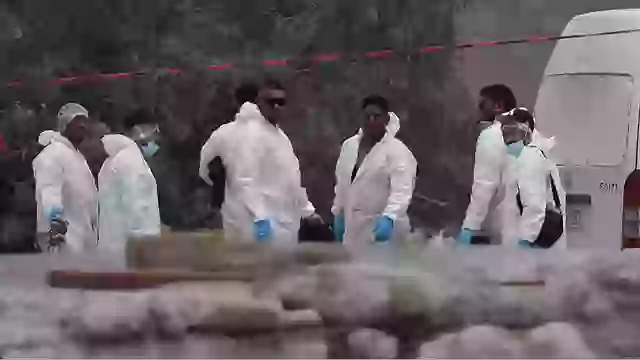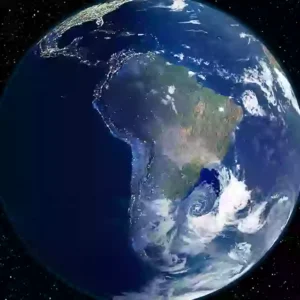Ciudad Juárez, Mexico — What began as a routine investigation turned into a horror story last week when authorities discovered nearly 400 corpses abandoned at a private crematorium just outside the bustling border city of Ciudad Juárez, across from El Paso, Texas. The startling revelation has shaken the region and raised unsettling questions about oversight, ethics, and the treatment of the dead in a part of the world long troubled by violence and bureaucracy.
According to the State Attorney General’s Office in Chihuahua, 383 full human bodies and the remains of at least six others were found inside the facility, many of them stacked atop one another, others left lying on stretchers or plastic sheets. Some bodies appeared to have been embalmed and preserved for years. Authorities now believe many were never cremated or delivered to families, as initially promised by the facility’s owners.
A Scene Beyond Description
Law enforcement officers entered the building after neighbors reported a foul smell emanating from the property. What they found defied even their worst expectations.
“There was no refrigeration,” said Chihuahua State Prosecutor César Jáuregui at a press conference. “The scene was chaotic, disrespectful, and inhumane. Some of the bodies were stored in rooms without any temperature control. Others appeared to have been placed in makeshift storage areas, covered with tarps or plastic bags.”
Images released by investigators showed rooms filled with stacked coffins, wooden pallets holding corpses wrapped in sheets, and boxes labeled with cremation orders that were never fulfilled.
The Missing Link Between Death and the Living
Authorities believe the crematorium, which had been operating legally for several years, stopped performing proper cremation and burial services sometime in 2021. Instead, staff members embalmed the bodies and simply left them inside the facility. Many families reportedly paid thousands of pesos — the equivalent of several hundred dollars — for services they believed had already been carried out.
The discovery has triggered not only criminal investigations but also a logistical nightmare. Forensic teams are now working around the clock to identify the remains through fingerprint analysis, dental records, and, in some cases, DNA testing. Many of the bodies had identification tags, suggesting they were received from local hospitals, morgues, and even government agencies handling indigent deaths.
Grief Reopened
For many families who entrusted their loved ones to the care of this crematorium, the news has been nothing short of devastating.
“I got a call saying my father’s body was found,” said Lidia Torres, a Juárez resident who had arranged for her father’s cremation in 2022. “I cried then. I am crying again now — not because I miss him, but because he was lied to, and so was I.”
Local officials have set up a hotline and grief counseling centers for relatives who suspect their loved ones’ remains may be among those discovered. As of this writing, over 250 families have come forward seeking answers.
The Legal Fallout
Mexican authorities have launched a criminal investigation into the owners and operators of the crematorium, who are currently at large. They are wanted on multiple charges, including abuse of a corpse, fraud, obstruction of justice, and possible violations of public health laws.
“We will hold accountable those who treated human remains with such disrespect,” said Attorney General Jáuregui. “This is not just about legal failure; it is a moral collapse.”
A warrant has been issued for the owner, whose identity has not yet been made public, though police confirmed they have been monitoring the U.S.–Mexico border for any attempted crossings.
A Broader Crisis Exposed
This is not the first time Mexico has faced scrutiny over the handling of human remains. In a country still grappling with the aftermath of drug wars, mass graves, and tens of thousands of missing persons, forensic resources are frequently overwhelmed. Many states lack sufficient morgue space, forensic staff, or cremation facilities. The result is a patchwork system vulnerable to corruption and neglect.
“This tragedy is symptomatic of a national crisis,” said Dr. Alejandro Méndez, a forensic anthropologist based in Mexico City. “We have no unified registry of the dead. In many cases, the government offloads responsibility onto private entities without ensuring they are equipped to handle it.”
Cross-Border Implications
Because Ciudad Juárez shares a border with El Paso, the case has drawn attention from U.S. officials as well. Some of the crematorium’s clients were U.S. citizens with family ties in Mexico. American families who sent bodies across the border for religious or financial reasons may now be forced to reconsider what happened to their loved ones.
“We are in communication with Mexican authorities and are reviewing all death certificate records associated with U.S. citizens,” a spokesperson from the U.S. Consulate in Ciudad Juárez said.
What Happens Next?
The state government has temporarily taken control of the site and moved the remains to refrigerated morgue trucks to prevent further decomposition. Authorities say a national database of recovered remains will be established, and federal assistance has been requested to manage DNA testing.
Meanwhile, locals have erected a small shrine near the crematorium, laying candles and flowers for the unknown dead. The words scrawled on a handmade sign capture the weight of the moment: “Aunque olvidados por algunos, ustedes son recordados por nosotros.” (“Though forgotten by some, you are remembered by us.”)
A Reckoning Ahead
As Mexico prepares for elections later this year, the tragedy in Juárez has already become a flashpoint in debates about government oversight, forensic infrastructure, and human dignity. For now, however, the focus remains on identifying the dead — and giving families the closure they were once promised, but never received.
“This is not just about death,” said Dr. Méndez. “It’s about how we treat the dead. And that, in the end, reflects who we are as the living.”











